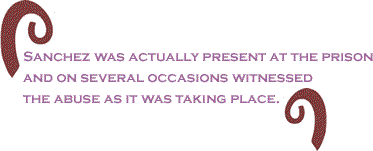
|
|||||||||||||||||||||
 |
In its December 2003 cover story Hispanic magazine featured an article about Lieutenant General Ricardo Sanchez titled "Soldier of Fortune: Far from Home, Lt. Gen. Ricardo Sanchez Leads the Effort to Stabilize Postwar Iraq." Sanchez was the top U.S. commander in Iraq during the first year of the occupation. Rick Sanchez, as he was known growing up, spent his childhood two miles from the Mexican border in Rio Grande City in Starr County, Texas. Today, Starr County remains the poorest county in the United States. The son of a single-parent family, his uneducated mother once made him spend the day picking cotton as she had done so that he would learn the value of hard work. In 1973, he defied the odds and graduated from Texas A&I University with a double major in history and mathematics, entered the Army, and quickly rose through the ranks. He also holds a master's degree in operations research and systems analysis engineering from the Naval Postgraduate School.
According to 2002 Department of Defense statistics, only 4.1% of all active duty officers in the U.S. armed forces are of “Hispanic descent” (compared to 8.5% for African Americans). As the highest-ranking Latino in the U.S. Army and only the ninth Latino general in the history of the Army, Sanchez believes he is a role model for young Latinos. He told Hispanic magazine: “Whether you like it or not, once you are honored with these kind of responsibilities, and more importantly blessed by all those great people over the years who allowed you to succeed, it’s inevitable that you will be looked at as a role model.”
Sanchez’s assertions in the Hispanic interview deserve our scrutiny. He said: “When I became a soldier the ethics and the value system of the military profession fit almost perfectly with my own heritage. It made it very easy for me to adapt to the military value system.” In light of recent revelations about Sanchez’s role in the abuse of prisoners carried out by U.S. personnel at the Abu Ghraib prison, one can only wonder what Sanchez understands to be the “ethics and the value system of the military profession” and the values of his “heritage.”
Official documents obtained by the Washington Post in June revealed that Sanchez had a direct connection to the inhumane interrogation methods employed against Iraqi prisoners. Although in October of 2003 he slightly reduced the number of extreme practices, he authorized the continued application of methods such as the use of sentry dogs to incite fear, solitary confinement for more than 30 days, and the manipulation of a prisoner’s diet. Sanchez did not eliminate these methods until media revelations broke concerning the torture scandal. As the investigation of the Abu Ghraib scandal proceeded, it was learned that the International Committee for the Red Cross had filed numerous complaints about the treatment of prisoners at Abu Ghraib and other U.S.-run prison facilities in Iraq. Although those reports were handed over to U.S. authorities, Sanchez told the Senate Armed Services Committee he had never seen them and that he was unaware of the abuses. But one military officer cited in the Washington Post article claimed that Sanchez was actually present at the prison and on several occasions witnessed the abuse as it was taking place. According to one report, the uncropped version of a widely circulated photo of a U.S. guard holding a dog on a crouching and naked Iraqi prisoner reveals Lt. General Sanchez off to the right observing the scene.
The Pentagon continues to deny these allegations and, as one might expect, Sanchez’s family has rushed to his defense. On the local NBC affiliate in South Texas, his sister Diane Sanchez stated: "I know my brother and I know what he is made of and he's a man of very high morals and standards." Despite his sister’s protestations, young Latinos and Latinas hungry for role models need to ask about the extent to which Sanchez was willing to abandon his “very high morals and standards” in the service of raw imperial power. To what extent did the process of assimilation and “Hispanic success” transform a poor Mexican American boy into an overseer of the Bush/Rumsfeld torture regime? If the great labor organizer Cesar Chavez taught us that the greatest contribution we can make is to serve the poor and the oppressed, must we not view Lt. General Sanchez’s actions as a gross corruption of “Latino values”? When the Pentagon announced Lt. General Sanchez’s departure from Iraq in May, it was widely assumed that he would be promoted to a four star general and given the top post in the U.S. Southern Command in charge of Latin America. But it was not long before NBC news reported that although Sanchez might still be nominated for a fourth star the prisoner abuse scandal could “complicate that process.” In an interview with the BBC, Brigadier General Janis Karpinski, who was in charge of U.S. military police units in Iraqi prisons, suggested that Sanchez was fully aware of the abuses.
Whatever his future assignments may be, Rick Sanchez will go down in history as the Mexican American general who approved the use of attack dogs against naked Iraqi prisoners. In the future perceptive students will point out that dogs were one of the most effective weapons used by the Spanish invaders and colonizers of Mexico to incite terror in the indigenous population. They will note the disturbing irony of Lt. General Sanchez, the "Hispanic of the Year" with Mexican roots, turning loose the dogs of war against another colonized people. Jorge Mariscal is Director of the Chicano/a~Latino/a Arts and Humanities Program at the University of California, San Diego. He was drafted into the U.S. Army in 1968 and served in Viet Nam the following year. His new book is Brown-eyed Children of the Sun: Lessons from the Chicano Movement, 1965-75. |
July
8 2004 |
|||||||||
|
|||||||||
|
|
|||||||||
| Printer Friendly Version | |||||||||
 |
|||||||||
| |
|||||||||
| |
|||||||||




























